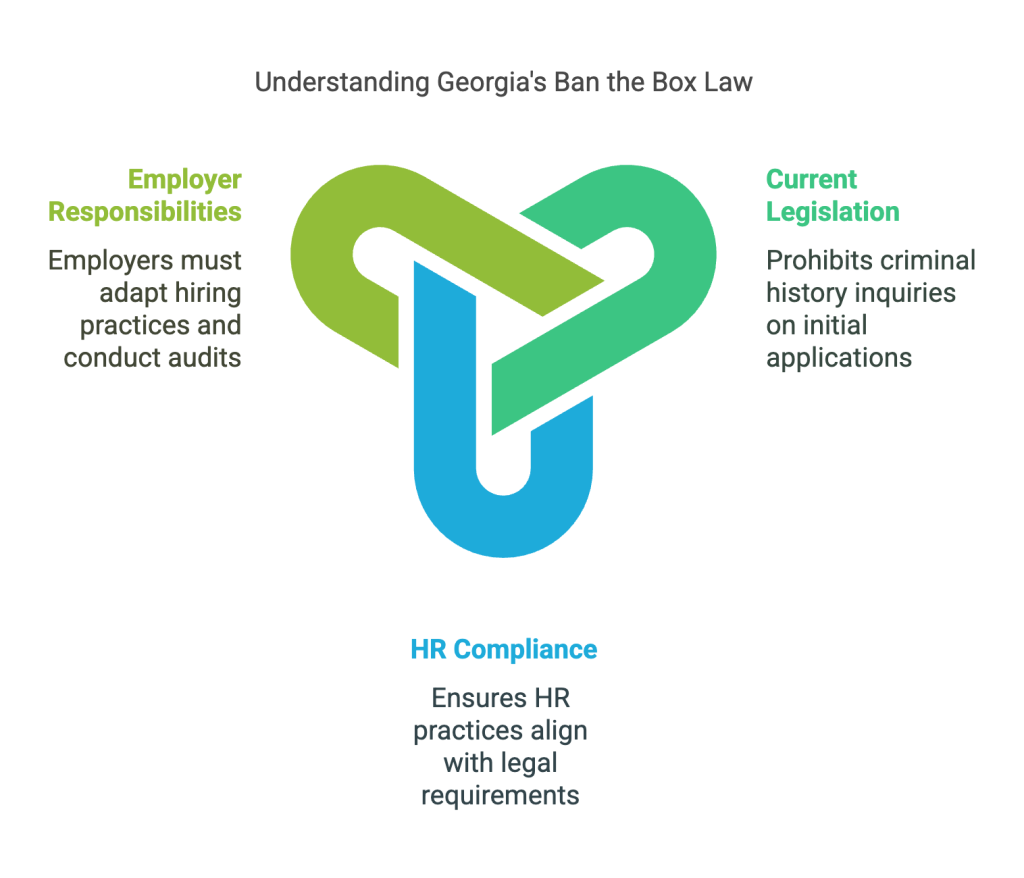In recent years, "Ban the Box" has become a significant movement in the push for fair and equitable hiring practices across the United States. As of 2025, Georgia has made notable strides in refining and implementing these policies to create a more inclusive job market. Both employers and job seekers need to stay informed about these changes, as they carry implications for hiring procedures, job applications, and compliance with state regulations.
Key Takeaways
- Ban the Box in Georgia aims to eliminate bias by removing criminal history queries from job applications, allowing individuals to be considered based on their qualifications first.
- Progress in Georgia includes milestones like the 2015 statewide policy for public employers and the 2023 expansion to most private sector jobs, making hiring more inclusive.
- Employers must adapt their hiring processes to delay criminal history inquiries and ensure that decisions focus on applicants' skills and the relevance of past offenses to the job.
- Technological advancements, such as AI in hiring, can help minimize bias but require careful monitoring to avoid unintentionally excluding qualified candidates.
- Removing barriers for those with criminal records helps decrease recidivism, integrating them into the community, and enhancing societal well-being.
EXPERT INSIGHT: We HR professionals are big promoters of fair hiring talk, but "Ban the Box" puts the talk into practice. It's all about allowing individuals the opportunity to be considered for who they are today, rather than what appears on paper from the past. I have learned that when employers eliminate barriers and take the lead with trust, they not only open up opportunities, but they transform lives. Fair hiring is not only compliance, but compassion in practice. Why? Well, sometimes the second chance versus the closed door is one checkbox. - Charm Paz, CHRP
Introduction
"Ban the Box" is a movement aimed at removing the checkbox on job applications that inquires about an applicant's criminal history. This shift allows individuals to be evaluated on their skills and experience rather than past mistakes.
In Georgia, Ban the Box is vital to achieving fair hiring policies. It encourages second-chance hiring, offering those with criminal records a fair shot at employment. The policy helps dismantle barriers, equipping job seekers with a fresh start while promoting a more inclusive workforce.
By giving individuals the opportunity to rebuild their lives through work, Ban the Box also supports a broader societal goal: reducing recidivism and fostering a fairer job market. As an employer or job seeker, understanding and embracing these changes is essential. Are you incorporating Ban the Box in your hiring practices?
The Evolution of Ban the Box in Georgia
The Ban the Box movement in Georgia began its journey with grassroots advocacy aimed at fair employment practices. From its inception, the focus was on removing barriers for individuals with criminal records, ensuring they have a fair chance at job opportunities.

Over the years, significant legislative milestones have driven the movement forward. In 2015, Georgia took a pivotal step by implementing a statewide Ban the Box policy for public employment. This change removed the box asking about criminal history from initial job applications, allowing candidates to be judged on merit before disclosing their past.
Fast forward to 2021, and the movement gained further momentum as several counties and cities within Georgia adopted similar policies for private employers. This growing trend highlighted the importance of fair hiring practices and set a precedent for further state-level action.
In 2023, Georgia witnessed the passing of comprehensive legislation that expanded Ban the Box requirements to include most private sector jobs. This shift marked a new era for the state's employment landscape, emphasizing transparency and fairness across the board. Employers now needed to refine hiring processes, ensuring their practices aligned with the updated regulations.
The societal impact of this evolution is evident. Studies have shown that individuals with access to employment are less likely to reoffend, which directly contributes to reduced recidivism rates. Ban the Box enables this by providing a true second chance for many, opening doors previously closed due to past mistakes.
With these changes, Georgia has not only embraced a more inclusive job market but has also set a positive example for neighboring states. As the movement continues to refine practices, the question remains: What further steps can be taken to cement these achievements and ensure ongoing progress?
In this evolving environment, it’s essential for both employers and job seekers to stay informed. The movement is not just about removing a checkbox; it’s about fostering an equitable system that benefits society as a whole.
Legal Dimensions and Compliance

Current Legislation
As of 2025, Georgia's Ban the Box legislation has specific requirements for employers. The key law prohibits employers from asking about criminal history on initial job applications. This law applies to state-level public employers and contractors, setting a precedent for fair hiring in the state. Private employers aren't legally bound, but many choose to follow these practices voluntarily. Doing so not only aligns with ethical hiring but may also expand the talent pool.
HR Compliance
HR departments in Georgia must adapt to these regulations to ensure compliance. Implement a straightforward screening process by postponing inquiries about criminal histories until after a conditional offer is made. This streamlined approach minimizes bias and focuses on qualifications and skills. Regular training for HR personnel is essential to comprehend the nuances of these laws and maintain compliance. Establishing clear guidelines for when and how to discuss a candidate's background ensures fairness.
Employer Responsibilities
Employers should understand the importance of this legislation in the broader hiring process. Begin by reviewing your hiring practices and job applications to ensure they're in line with state law. Conduct routine audits to confirm adherence. Employers must perform due diligence when a candidate's criminal history eventually comes into play. Evaluate whether the past criminal conduct directly relates to the duties of the position, ensuring decisions are justifiable. Balancing compliance with responsible hiring is both a legal requirement and a chance to support rehabilitative efforts. Are your current practices enhancing or hindering fair hiring? Consider reviewing them to create a more inclusive environment.
Technological Advancements in Hiring Processes
Technology has revolutionized hiring in Georgia, especially under Ban the Box. Digital applications are the new norm. They've streamlined the process, making it quicker and more efficient. Job seekers now submit resumes online, allowing employers to access a larger talent pool.
With advancements in digital platforms, employers can filter applications without bias. This aligns with the goals of Ban the Box, helping focus on skills and qualifications first. It’s a win-win for both parties.
AI and machine learning play a big role. These technologies assist in screening candidates. They automate tasks like scheduling interviews and evaluating candidate fit. Importantly, they help remove human bias, promoting fairer hiring.
But there are challenges. Automation may inadvertently screen out qualified candidates. Systems need proper calibration to prevent this. Employers should continuously review the algorithms to ensure they support inclusive practices.
Integration of technology also means keeping up with data protection laws. Employers should understand how to handle applicant data responsibly.
To sum up, technology is reshaping recruitment. Employers must harness these tools wisely, ensuring they enhance rather than hinder, the objectives of Ban the Box.
The Social Argument for Ban the Box
These policies give job seekers with criminal records a fair shot at employment. Removing the box that asks about criminal history levels the playing field, allowing applicants to be judged on their skills and qualifications first.
People with criminal records often face discrimination in the hiring process. Ban the Box helps them get through initial screenings based on merit, enabling them to prove their worthiness during interviews. This approach can reduce recidivism by providing genuine employment opportunities for former offenders.
Consider Mary in Atlanta, who struggled for years to find work after a minor drug offense. With Ban the Box, she landed a job at a local restaurant, steadily progressing to a managerial role.
Such stories highlight the broader community impacts. Employed individuals contribute positively to society, leading to healthier and more financially stable communities. Ban the Box does more than just help individuals—it fosters community development by integrating more people into the labor force.
Think about how your hiring practices affect not just the individuals but the community at large. Are you missing out on potential talent due to outdated practices? As Georgia moves forward with these policies, both employers and job seekers must embrace the push for fairer, more inclusive hiring standards.
Actionable Takeaways for Employers
Policy Implementation
Implementing Ban the Box policies requires a clear plan. First, remove the checkbox regarding criminal history from your job applications. Instead, gather this information at a later stage in the hiring process, such as during or after the initial interview.
Review job descriptions to ensure they focus on skills and qualifications relevant to the position. Tailor-screening questions to emphasize these areas.
Consider appointing a dedicated team or individual to oversee Ban the Box initiatives. This team can answer questions, provide updates, and ensure adherence to the regulations.
Training Programs
Train your HR personnel and hiring managers on the nuances of Ban the Box regulations. Include legal requirements, best practices, and the importance of fair hiring.
Regular workshops or seminars can help keep your team updated on any legislative changes. Engage an expert in the field to provide fresh insights and answer specific questions.
Use role-playing exercises to practice handling interviews with candidates who have criminal records. This can build confidence in navigating sensitive conversations.
Continuous Monitoring
Set a timeline for periodic reviews of your hiring practices. This review should ensure your policies remain aligned with current laws and societal expectations.
Monitor feedback from job applicants. Their perspectives can offer valuable insights into potential improvements in your application process.
Stay connected with organizations like the PBSA. Their resources and updates are invaluable for understanding changes in the legal landscape.
Keeping your practices current not only ensures compliance but fosters a fair, inclusive workplace.
Actionable Takeaways for Job Seekers
Navigating the job market with a criminal record can feel challenging, but the Ban the Box movement in Georgia offers a more level playing field.
Start by understanding the application process in 2025. Many employers in Georgia have removed the checkbox asking about criminal history on initial applications. This means your first impression can be about your skills and experience, not your past.
Once you're in the interview stage, honesty is vital. If your criminal record is relevant, prepare to discuss it candidly. Focus on rehabilitation and any positive steps you've taken since the conviction. This can include education, volunteer work, or consistent employment.
Leverage resources. Georgia has several support systems for job seekers with criminal records. Look into organizations that provide job training, resume help, and interview coaching. These resources can boost your confidence and prepare you for the job market.
Practicing mock interviews is another powerful tool. This can help you articulate your experience and prepare for potential questions about your past. Focus on how you've grown and what you offer as an employee today.
Stay informed about your rights under Ban the Box. Understanding these can empower you during the hiring process and ensure you aren't unfairly discriminated against.
By taking these steps, you can navigate the job market more effectively, turning your focus towards a future with new opportunities.
Conclusion
Georgia's Ban the Box policy is set to keep evolving. The trajectory points toward even more inclusive hiring practices. Expect more nuanced measures that dig deeper into assessing the impact of removing criminal history questions from applications. As trends lean towards equity, both employers and job seekers must stay aware of any updates.
How will this policy continue shaping the job market?
For businesses, fostering fair practices could soon become not just a legal obligation but a competitive advantage. This also means staying engaged with legislative changes. For job seekers, knowing your rights under Ban the Box can empower you in your job search. The future of hiring in Georgia will likely place greater emphasis on skills and experience, unfettered by stigma.
Are you prepared for these changes?
By keeping informed and engaged, you can navigate these shifts, ensuring that fair employment practices benefit all.
Further Reading
For more insights into employment background checks and hiring best practices, visit the GCheck blog. Their articles cover a range of topics, from compliance tips to technological advances in the hiring process.
For comprehensive information and updates on background screening, explore PBSA. Their resources offer valuable guidance for staying informed about changes in fair hiring policies, including Ban the Box.
Keeping abreast of developments in Ban the Box ensures that employers can sustain inclusive and compliant hiring practices. For job seekers, staying informed helps in navigating the job market confidently.
Frequently Asked Questions (FAQs)
1. Does Ban the Box apply to private companies in Georgia?
Ban the Box does not currently apply to private companies in Georgia. It primarily affects state agencies and public employers.
2. How can Georgia job seekers benefit from Ban the Box policies?
Ban the Box policies remove the criminal history check box from job applications. This allows job seekers with criminal records to showcase their skills and experience without initial bias. They have a fair chance to reach the interview stage based on merit, not their past.
3. What companies in Georgia have adopted Ban the Box?
Many major companies across the United States, including some operating in Georgia, have adopted Ban the Box. This includes companies like Target, Home Depot, and Coca-Cola. These companies aim to ensure fair hiring practices.
4. How does Ban the Box compliance protect Georgia employers?
By following Ban the Box guidelines, employers can broaden their talent pool and reduce hiring bias. This compliance can also enhance diversity within the workforce and improve the company's reputation in the community.
5. Are employers still allowed to check criminal records after an interview in Georgia?
Yes, employers in Georgia can check criminal records after the interview. The idea is to focus initially on qualifications and skills. Employers may still conduct a background check later in the hiring process.
6. How does Ban the Box influence second-chance hiring in Georgia?
Ban the Box encourages second-chance hiring by allowing people with past convictions to demonstrate their qualifications first. This policy can help reduce recidivism by supporting rehabilitation through employment opportunities.
7. What are the challenges employers might face with Ban the Box in Georgia?
Employers might worry about workplace safety or repeat offenses. However, a thorough background check and assessment after the initial application can help address these concerns while supporting fair hiring practices.
8. What steps should Georgia employers take after a background check reveals a criminal record?
Employers should consider the nature of the offense, its relevance to the job, and the time elapsed since the conviction. Engage in a dialogue with the candidate to understand their circumstances and potential for rehabilitation.
9. How can Georgia job seekers prepare for interviews if they have a criminal record?
Be honest about your past if asked and focus on how you've grown since then. Highlight work experiences, skills, and personal achievements. Practice explaining your background positively and professionally.
10. What other states have implemented Ban the Box policies similar to Georgia's?
Many states have enacted Ban the Box laws, including California, New York, and Illinois. Each state's laws may vary, but the core principle remains to help individuals with criminal records have fair access to job opportunities.

GCheck Editorial Team
Meet the GCheck Editorial Team, your trusted source for insightful and up-to-date information in the world of employment background checks. Committed to delivering the latest trends, best practices, and industry insights, our team is dedicated to keeping you informed.
With a passion for ensuring accuracy, compliance, and efficiency in background screening, we are your go-to experts in the field. Stay tuned for our comprehensive articles, guides, and analysis, designed to empower businesses and individuals with the knowledge they need to make informed decisions.
At GCheck, we're here to guide you through the complexities of background checks, every step of the way.






